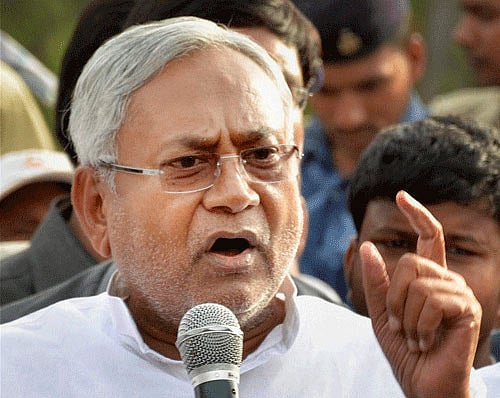
Seventy-year-old N K Singh, one of the oldest liquor traders in Bihar, was crestfallen when Nitish Kumar, barely a week after taking over as chief minister for the third consecutive term, announced that liquor would be banned in the state with effect from April 1, 2016.
Nitish announced this on November 26, the day Bihar organises Prohibition Day. The chief minister said he was fulfilling the promise he made to a motley group of women in Patna shortly before the Assembly election. He had said in July that if voted to power again, he would ensure prohibition was clamped throughout Bihar.
Women’s organisation like Durga Dasta, Jeevika and other non-governmental organisation (NGOs) hailed Nitish for fulfilling his promise within days of donning the mantle. Many woman leaders pledged their life-long support to the JD(U) strongman. Padma Shri award winner and social activist Sudha Verghese, who works for the uplift of Mahadalits, termed Nitish decision as a ‘revolutionary step’ which would not only check incidents of domestic violence, but put an end to the growing cases of marital discord.
“It’s indeed a praiseworthy decision. Past experiences show that the hooch tragedies of Ara, Gaya and Muzaffarpur claimed 50 lives. If the state can strictly enforce liquor ban, precious lives could be saved. And this should be more important than earning crores of rupees through its sale,” argued political commentator Ajay Kumar.
Nitish may have fulfilled a poll-eve promise. But those doing business in this field are left twiddling their thumb what new trade they would do in this autumn period of life when their decades-old business is shut down from next fiscal.
Sanjay Kumar, 65, is one such liquor trader who feels that his family will be in deep trouble if the chief minister’s announcement is implemented from next financial year. “I and my two sons are into this business for decades. Neither me nor my kin have ever explored another business. We just don’t know what we will do from next fiscal,” he averred.
Equally embarrassed was Shekhar Swarup, executive director of the Globus Spirits, who, barely four hours before Nitish’s prohibition announcement on November 26, had declared that he was planning to set up a unit in Bihar in view of the increase in demand of liquor.
The cash-strapped state, which earns nearly Rs 4,000 crore (around 15 per cent of its total internal revenue) through the sale of liquor and an additional Rs 1,500 crore through VAT (value added tax) collected on it, will have to redo its maths.
Particularly at a time when the consequences of implementation of the Seventh Pay Commission recommendations make huge impact on its exchequer. There will certainly be demand from state government employees to revise their salaries and the administration will have to agree to it.
When Nitish took over the reigns of Bihar in November 2005, there were around 3,000 liquor shops in the state.Today, the number has gone up to 6,000. Ten years back, Bihar’s revenue generation from the sale of alcohol was merely Rs 295 crore. The figure is likely to touch Rs 4,000 crore in 2015-16.
The substantial hike in revenue is due to Nitish’s effort, as he, under the new liquor policy, set up the Bihar State Beverages Corporation Limited in 2006 and made it mandatory for all manufacturers to sell liquor through it.
The corporation helped keep a check on leakage. Earlier, the sale of liquor was directly through distributors and wholesalers. As the Excise Department started issuing licences for the marketing of liquor, the number of liquor shops doubled in the last 10 years.
Flip side
With the liquor ban order coming into force from next fiscal, it is estimated that nearly 25,000 people involved in the business, directly or indirectly, will be rendered jobless. This includes those working in the 150 bars and 30 bottling plants in the state.
“The number of people involved in the business, from manufacturing unit, bottling plant to wholesalers and retailers, is not less than 25,000,” argued a Commercial Taxes Department official and wondered what would those traders do who are into this business for the last three-four decades.
But Excise Minister Abdul Jalil Mastan says the government is not a baniye ki du-kan (grocery shop), which has to constantly think of its revenue and profit. “The government is a welfare state. If the chief minister thinks about those women, who have been at the receiving end due to the mushroom growth of liquor shops, the prohibition order should be welcomed,” he said.
Nitish too argued that he was aware of the potential loss of revenue through the ban order. “I know there will be huge loss of revenue but I will still fulfil the promise to bring happiness on the face of women from poor families. So far as revenue loss is concerned, it will be offset in the next two to three years. I also know that some people will criticise me by arguing that liquor will come from other sources. I will tackle this problem as and when the situation so arises,” said Nitish reiterating his resolve to enforce prohibition.
This is not for the first time that liquor will be banned in Bihar. In 1977, the then Bihar chief minister Karpoori Thakur, Nitish’s role model, had enforced prohibition. But the order had to be revoked a year later, after it proved to be ineffective.
The law enforcing agencies foresee challenges ahead in implementing ban orders as Bihar shares porous border with Nepal in the north and Jharkhand in the south. Similarly, it shares border with West Bengal in the east and Uttar Pradesh in the west. None of these neighbours have enforced prohibition. Little wonder, the Bacchus lovers would use all their resources to procure it from the neighbouring states or the Himalayan Kingdom, Nepal.
